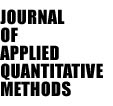 |
|
|||
JAQM Volume 7, Issue 4 - December 30, 2012
Contents
Credit Flow, Output Gap and Inflation: Nominal Convergence Challenges for the EU New Member States (p )
Bogdan-Gabriel MOINESCU
Complementary to research on the importance of real convergence for a sustainable euro adopting process, this study analyzes the complexity of the mechanism by which credit growth may become a threat to meeting the inflation rate criterion. The added value of this approach consists of two elements. First, the analysis provides a quantitative mechanism for assessing the fundamental dependence of the output gap on credit development in the economy, econometric results of this study showing that about 15 percent of the credit flow is reflected in the deviation of economic growth from its potential level. Secondly, the study shows that macroprudential policy can contribute to meeting the price stability criterion, especially given that monetary policy instruments have limited effectiveness in countering excessive lending, econometric results showing that about 15 percent of the output gap changes into inflation in the new EU Member States. Thus, even if there are no financial stability indicators among the Maastricht criteria, at least the credit growth represents a macroprudential area with important implications on nominal convergence.
A Quantitative Analysis of the Resources for e-Learning in Romania (p )
Laura ASANDULUI
Information and Communication Technologies have been the main drive behind changes within society and economy for more than a decade. A European Information Society for growth and employment is a strategic framework for the information society. Widespread access to the Internet is essential for the development of advanced services in the field of e-business, e-government, and e-learning. The resources for the development of e-learning in Romania are very low compared to the other countries in the EU. Romania belongs in a cluster with Bulgaria and Greece, which group is last on almost all the indicators in the present study.
An Empirical Analysis on Preferred Saving Instruments Based on the Enquiry “Financial Situation of the Romanian Households”
(p )
Ileana Gabriela NICULESCU-ARON
Keeping pace with the changing times and under the liberalized financial sector regime, the financial-banking institutions developed a new range of financial instruments that offer multiple saving opportunities. But, this innovative and diversified financial-banking system was not able to attract the population away from the traditional methods of saving. Pertinent results in the analysis of savings instruments that households resort to may be quickly obtained with the help of data from selective studies. To this purpose, the aim of this paper is to highlight some particularities of preferred saving instruments of the Romanian households, starting from the results of an enquiry that took place during 1-15 May 2012 on a sample of 1728 respondents, constituted with quota sampling. The study reveals that cash and bank savings still remain the most preferred methods of the households. The results also highlight that certain factors like financial education level, trust about the financial-banking system or the residence area have a significant impact on decisions regarding saving methods.

